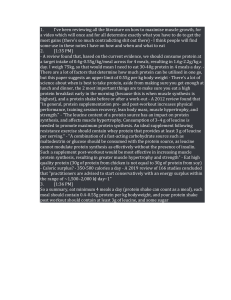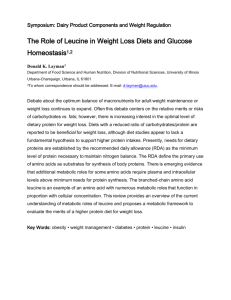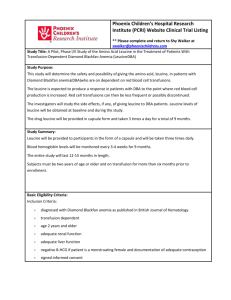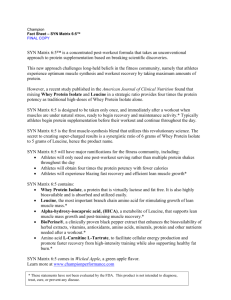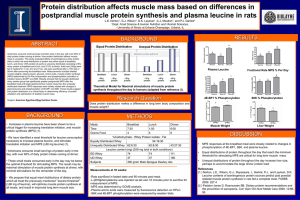Long-term effects of leucine supplementation on body composition
advertisement
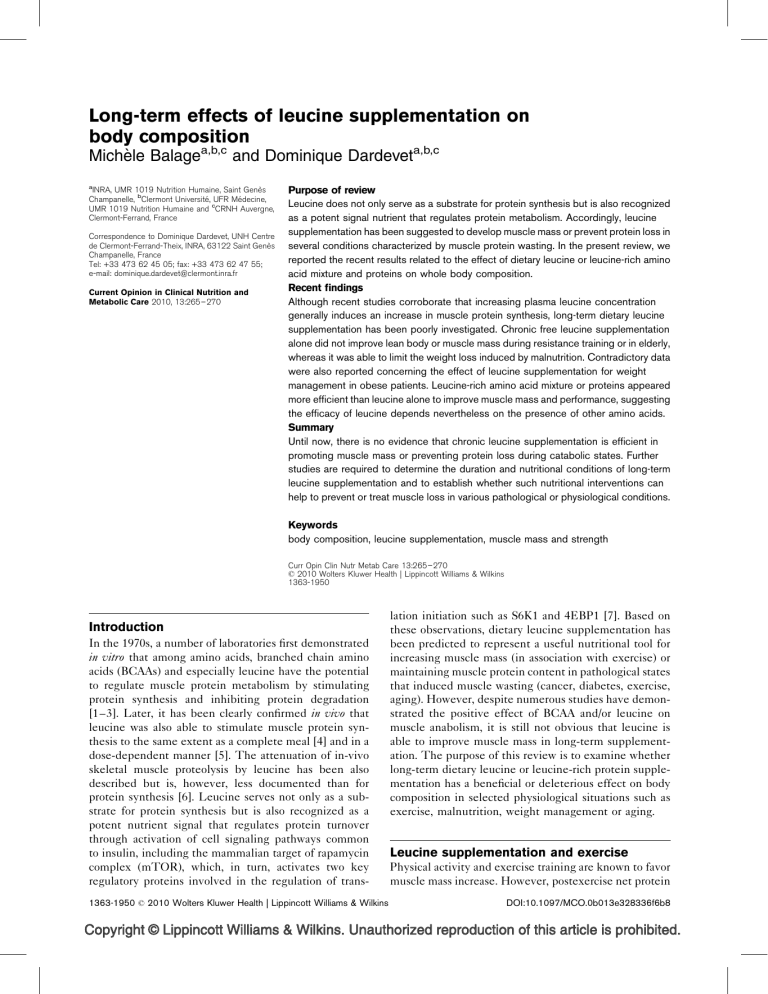
Long-term effects of leucine supplementation on body composition Michèle Balagea,b,c and Dominique Dardeveta,b,c a INRA, UMR 1019 Nutrition Humaine, Saint Genès Champanelle, bClermont Université, UFR Médecine, UMR 1019 Nutrition Humaine and cCRNH Auvergne, Clermont-Ferrand, France Correspondence to Dominique Dardevet, UNH Centre de Clermont-Ferrand-Theix, INRA, 63122 Saint Genès Champanelle, France Tel: +33 473 62 45 05; fax: +33 473 62 47 55; e-mail: dominique.dardevet@clermont.inra.fr Current Opinion in Clinical Nutrition and Metabolic Care 2010, 13:265–270 Purpose of review Leucine does not only serve as a substrate for protein synthesis but is also recognized as a potent signal nutrient that regulates protein metabolism. Accordingly, leucine supplementation has been suggested to develop muscle mass or prevent protein loss in several conditions characterized by muscle protein wasting. In the present review, we reported the recent results related to the effect of dietary leucine or leucine-rich amino acid mixture and proteins on whole body composition. Recent findings Although recent studies corroborate that increasing plasma leucine concentration generally induces an increase in muscle protein synthesis, long-term dietary leucine supplementation has been poorly investigated. Chronic free leucine supplementation alone did not improve lean body or muscle mass during resistance training or in elderly, whereas it was able to limit the weight loss induced by malnutrition. Contradictory data were also reported concerning the effect of leucine supplementation for weight management in obese patients. Leucine-rich amino acid mixture or proteins appeared more efficient than leucine alone to improve muscle mass and performance, suggesting the efficacy of leucine depends nevertheless on the presence of other amino acids. Summary Until now, there is no evidence that chronic leucine supplementation is efficient in promoting muscle mass or preventing protein loss during catabolic states. Further studies are required to determine the duration and nutritional conditions of long-term leucine supplementation and to establish whether such nutritional interventions can help to prevent or treat muscle loss in various pathological or physiological conditions. Keywords body composition, leucine supplementation, muscle mass and strength Curr Opin Clin Nutr Metab Care 13:265–270 ß 2010 Wolters Kluwer Health | Lippincott Williams & Wilkins 1363-1950 Introduction In the 1970s, a number of laboratories first demonstrated in vitro that among amino acids, branched chain amino acids (BCAAs) and especially leucine have the potential to regulate muscle protein metabolism by stimulating protein synthesis and inhibiting protein degradation [1–3]. Later, it has been clearly confirmed in vivo that leucine was also able to stimulate muscle protein synthesis to the same extent as a complete meal [4] and in a dose-dependent manner [5]. The attenuation of in-vivo skeletal muscle proteolysis by leucine has been also described but is, however, less documented than for protein synthesis [6]. Leucine serves not only as a substrate for protein synthesis but is also recognized as a potent nutrient signal that regulates protein turnover through activation of cell signaling pathways common to insulin, including the mammalian target of rapamycin complex (mTOR), which, in turn, activates two key regulatory proteins involved in the regulation of trans1363-1950 ß 2010 Wolters Kluwer Health | Lippincott Williams & Wilkins lation initiation such as S6K1 and 4EBP1 [7]. Based on these observations, dietary leucine supplementation has been predicted to represent a useful nutritional tool for increasing muscle mass (in association with exercise) or maintaining muscle protein content in pathological states that induced muscle wasting (cancer, diabetes, exercise, aging). However, despite numerous studies have demonstrated the positive effect of BCAA and/or leucine on muscle anabolism, it is still not obvious that leucine is able to improve muscle mass in long-term supplementation. The purpose of this review is to examine whether long-term dietary leucine or leucine-rich protein supplementation has a beneficial or deleterious effect on body composition in selected physiological situations such as exercise, malnutrition, weight management or aging. Leucine supplementation and exercise Physical activity and exercise training are known to favor muscle mass increase. However, postexercise net protein DOI:10.1097/MCO.0b013e328336f6b8 Copyright © Lippincott Williams & Wilkins. Unauthorized reproduction of this article is prohibited. 266 Anabolic and catabolic signals balance is positive only with ingestion of amino acids. Despite demonstration by Anthony et al. [8] that leucine increased skeletal muscle protein synthesis when given alone in rats following exercise, the efficiency of free leucine supplementation to stimulate muscle protein synthesis in humans after exercise is still controversial. A recent study reported that ingestion of whey hydrolysate, which induced a rapid and large increase in plasma leucine concentration, was more efficient to stimulate muscle protein synthesis after resistance exercise in men than ingestion of soy protein or casein, suggesting that leucine availability might be partly responsible for this beneficial effect [9]. However, despite a dramatic increase in plasma leucine, co-ingestion of free leucine with whey proteins does not further increase postexercise muscle protein synthesis [10–12,13]. These studies suggest that leucine may differentially modulate muscle protein metabolism depending on the type of protein ingested and the kinetic of appearance of the other amino acids after exercise. Chronic leucine supplementation and exercise The effect of chronic supplementation with various protein sources has been widely investigated to optimize the effects of exercise on body composition. For example, whey protein is considered as a high-quality protein because it contains large amounts of essential amino acids and is rapidly digested leading to rapid and important leucine availability [14,15]. Young athletes supplemented for 10 weeks with hydrolyzed whey isolate (1.5 g/kg/day), a leucine-rich protein, exhibited a significant increase in lean mass (þ7.5%) linked to a significant improvement in strength compared to casein supplementation [16]. An additional 10% reduction in fat mass was even observed in whey isolate-supplemented group. More recently, Hulmi et al. [17] also reported that chronic (21 weeks) supplementation with whey proteins favored resistance training-induced muscle hypertrophy in young healthy individuals compared to a nonenergetic placebo. These data suggest that chronic ‘high-quality protein’ supplementation is able to improve exercise-induced muscle mass gain and performance. However, the role of leucine in those effects is still under question as the effect of long-term leucine supplementation for promoting muscle hypertrophy and/or performance during resistance training remains, surprisingly, poorly documented. To our knowledge, only Crowe et al. [18] investigated the effect of 6-week dietary free leucine supplementation (45 mg/kg/day) on body composition and exercise performance on competitive outrigger canoeists. Leucine supplementation did not change whole body mass or percentage of body fat mass compared to placebo supplementation, whereas plasma leucine concentration was significantly increased. Nevertheless, leucine supplementation improved endurance performance by increasing time of exhaustion. There is some evidence that long-term leucine availability is sufficient to improve muscle mass or performance during exercise training. However, it needs to be associated with other amino acids to be efficient (for example, through leucine-rich proteins). Leucine supplementation and maintenance of lean body mass Involuntary (malnutrition) or intentionally (nutritional treatment of obesity) weight loss induces reduction in fat mass but is also associated with a reduction in lean body mass. It is, however, necessary to preserve muscle mass because muscle wasting induces a number of dysfunctions that may affect the recovery or health of individuals. Food restriction and protein malnutrition Donato et al. [19] studied the effect of a 50% increase in daily leucine intake in adult rats undergoing a 50% food restriction for 6 weeks. The leucine-supplemented rats exhibited significantly greater percentage of lean mass than control rats suggesting that leucine supplementation had preserved lean body mass loss induced by food restriction. Similar results have been observed with intermittent periods of 50% food restriction (1 week) followed by 2-week recovery with ad libitum feeding [20]. However, improvement in lean body mass did not translate into increased muscle mass or gastrocnemius protein content in these studies [19,20]. During protein malnutrition in young adult rats (5% casein diet or a protein-free diet for 1 week), leucine supplementation (1.15% of the diet) significantly reduced muscle weight loss [21,22] through inhibition of myofibrillar protein degradation. Conversely, 60-day free leucine supplementation during nutritional recovery after long-term protein deficiency in very young rats (6% casein for 120 days) did not improve whole lean body mass recovery and only tended to improve muscle weight restoration (þ7%) [23]. Leucine supplementation seems to be beneficial in reducing lean and muscle mass loss during severe protein malnutrition or food restriction without being fully efficient alone during the recovery period in young growing rats. Weight management The prevalence of obesity had significantly increased during the last decades and is a major public health problem leading to insulin resistance, type II diabetes, hypertension, atherosclerosis and cancers. Many dieting strategies have been proposed to induce short-term weight loss, but long-term weight management is more uncertain. The energy-restricted diets required for weight loss in obesity resulted in the expected body fat loss but also in muscle mass loss. Thus, in order to Copyright © Lippincott Williams & Wilkins. Unauthorized reproduction of this article is prohibited. Effects of leucine on body composition Balage and Dardevet 267 prevent muscle loss, the use of high-protein diets or supplementation with BCAA or leucine, based on their anabolic effects, has been suggested [24–27]. Moreover, leucine has been shown to decrease food intake through mTOR activation in the hypothalamus [28] and the stimulation of the leptin secretion, the satiety hormone [29]. In rodents fed a high-fat diet (HFD), leucine supplementation induced a marked reduction in diet-induced weight gain (2030%) compared to nonsupplemented diet [30,31] that resulted from a decrease in body fat without change in lean body mass. This effect has been explained by a decrease in food intake [31] or an increase in energy expenditure [30]. Increasing leucine intake had prevented the HFD-induced hyperglycemia and improved overall glucose tolerance in mice [30] without effect in rats [31]. Using a similar diet-induced obesity in mice, Naiziri et al. [32] reported no beneficial effect of leucine supplementation on body composition, energy expenditure or glucose tolerance. In humans, chronic moderate-to-high protein diets have been reported to increase weight and fat mass loss with minimizing lean mass loss compared with common reduced-carbohydrate diets in adult obese patients [33,34]. However, to our knowledge, long-term leucine or even BCAA supplementation has not been yet evaluated in any clinical study. Only a study using a whey protein fraction, that is, Prolibra, has shown to enhance weight loss in obese patients, in whom caloric intake was reduced 500 calories per day [35]. After 12 weeks of supplementation, the Prolibra group lost significantly more body fat and less lean muscle mass compared with nonsupplemented participants. However, as Prolibra is enriched in calcium and bioactive peptides, it is not possible to attribute the beneficial effect of such a supplement to unique leucine excess. The beneficial effect of leucine supplementation alone compared with high-protein diets in weight management or preservation of lean mass in energy-restricted obese patients is not clearly established yet. However, despite the lack of clinical studies, increased leucine availability in obese patients under caloric restriction may be a good nutritional tool to preserve lean and/or muscle mass. Leucine supplementation and sarcopenia Sarcopenia is characterized by a progressive loss of muscle mass and strength, which directly affects the mobility and health of elderly people. The origin of sarcopenia is, of course, multifactorial but may be partly explained by a decreased ability of aged muscle to respond appropriately to anabolic stimuli such as food intake [36,37]. This defect has been found to result from a decreased response and/or sensitivity of protein synthesis and degradation to physiologic concentrations of amino acids in elderly [38,39]. This was related to a defect of leucine to stimulate S6K1 activity [40] but postprandial stimulation of muscle protein synthesis and inhibition of protein degradation can be restored by a leucine-supplemented meal in either elderly rodent or humans [41–44]. Overall, these data suggested that increasing leucine availability may represent a nutritional strategy to control body composition during aging. However, the long-term effect of leucine via BCAA or leucinerich protein supplementation has not been extensively investigated. In rodents, a leucine-supplemented meal given everyday for 10 days was still able to restore the anabolic effect of feeding in old rats [41,42], but the duration of supplementation was not sufficient for muscle mass gain. Until now, long-term leucine supplementation alone in rodents has not been reported. Leucine-rich mixed amino acid mixture (62.5% BCAA, in which leucine constituted 31.3%) given for 1 month in 24-month-old rats has been shown to completely prevent the 30% reduction in total and fractional (myofibrillar, soluble and stromal fractions) muscle protein content observed in old rats [45]. Unfortunately, protein measurements were not associated with any information of muscle weight. Moreover, physical performance of supplemented old rats, determined by measuring the time of exhaustion during a swim test, was also returned to that of young rats (6-months-old). In the study by Pansarasa et al. [46] with the same amino acid mixture given for 2 months to 18-month-old rats, crosssectional area of fibers of the soleus muscle was increased but neither whole body weight or soleus mass was improved after supplementation. No improvement in muscle mass was also observed in old rats fed for 1 month with leucine-rich whey proteins despite an increase in postprandial muscle protein synthesis [15]. Few studies have been undertaken to study the chronic leucine supplementation in elderly humans. Over a 3-month period, a 7.5 g free leucine daily supplementation given in each main meal (2.5 g at breakfast, lunch and dinner) did not induce any increase in total or muscle lean body mass and did not improve muscle strength compared to an isoenergetic placebo [47]. However, in this study, it is important to note an 18–25% decline in basal plasma valine concentration in the leucine-supplemented group suggesting an amino acid imbalance. Other studies have investigated the effect of long-term supplementation with amino acid mixtures, wherein leucine formed the highest percentage of the mixture (Table 1). It has been reported at first that 3 months of such a supplementation significantly improved muscle strength and physical capacity in healthy elderly people [48–50]. Copyright © Lippincott Williams & Wilkins. Unauthorized reproduction of this article is prohibited. 3 months AA, amino acid; LBM, lean body mass; nd, not determined. " increase, $ no change. Verhoeven et al. [47 ] Dillon et al. [52] Except the recent study of Verhoeven et al. [47], longterm free leucine supplementation in elderly has not been investigated; thus, it is not possible to definitively conclude on the efficacy of leucine per se to counteract or prevent sarcopenia. However, taken together, the experiments with enriched leucine amino acid mixture supplementation both in rats and humans suggested that improvement in lean body mass and/or muscle mass and strength needs very long-term supplementation to translate into beneficial modification of body composition in elderly. 7.5 3 months 2.8 2 7.5 g EAA mixture (18.6% leu) vs. baseline 3 2.5 g leucine vs. placebo 4 months 7.9 Borsheim et al. [51] Subsequently, it has been shown that 3–4 months of supplementation with a leucine-rich amino acid mixture significantly improved lean body mass in elderly people [51,52] with [51] or without [52] improvement in muscle strength and physical function. Only with a longer leucine-enriched essential amino acid mixture supplementation period (8–16 months), an improved 13–17% whole body lean mass in all areas (legs, arms and trunk tissues) associated with an amelioration of muscular strength and performance has been described in healthy elderly people [53]. These data suggested that improvement in lean body mass in elderly was more marked with a very long-term leucine-enriched amino acid mixture than with a high dose of leucine alone. $ muscle strength $ muscle strength "leg strength (þ 22%); " physical function (6–12%) nd "LBM (þ13–17%) after 8 months; $ fat mass $ body weight; "LBM (þ2.4%); $ lean leg mass, fat mass; bone $ body weight –"LBM (þ3.9%) $ fat mass $ LBM, fat, leg lean mass, leg fat 8–16 months Solerte et al. [53] Scognamiglio et al. [50] 100 men and women (> 65 years) 15 men (> 65 years) with chronic heart failure 41 healthy men (> 65 years) 12 men and women (67 6 years) with glucose intolerance 14 healthy women (> 65 years) 30 healthy men (71 4 years) Scognamiglio et al. [49] 2 4 g AA mixture (31% leu) vs. placebo 2 11 g EAA mixtureþarg (36% leu) vs. baseline 2.48 nd 3 months 2.48 $ BMI 3.73 3 months " ambulatory capacity (þ 18–30%) – " strength (þ 16%) " ambulatory capacity (þ 26–38%) – " strength (þ 38%) " 6-min walk test (þ 12%) nd 44 men (> 65 years) Scognamiglio et al. [48] 12 g AA mixture (31% leu) vs. placebo 12 g AA mixture (31% leu) vs. placebo 2 4 g AA mixture (31% leucine) vs. placebo 3.73 3 months Muscle performance Body composition Duration Corresponding leucine supplement (g/day) Source Participants Reference Supplementation design Table 1 Effect of leucine supplementation on body composition and muscle performance in elderly Outcomes 268 Anabolic and catabolic signals Another strategy based on the improvement in muscle protein anabolism sensitivity to normal daily leucine intake in elderly has been suggested. Indeed, the defect in leucine or food-stimulated muscle protein anabolism in old rats may be reversed when supplemented with antioxidants [54] or NSAIDs [55]. Conclusion Although it is evident that leucine is able to stimulate muscle protein synthesis through activation of the mTOR signaling pathway, its efficacy to improve muscle mass in various physiological conditions is still controversial because several studies have led to contradictory results. However, to our opinion, some factors must be considered to explain these discrepancies before withdrawing nutritional strategies based on leucine supplementation. First, leucine supplementation is known to induce a decrease in both valine and isoleucine concentrations that is visible as soon as the first leucine-supplemented meal is given [40]. To prevent the fall of plasma valine and isoleucine concentrations induced by leucine excess, the ‘leucine meal’ should also be supplemented with valine and isoleucine. With chronic leucine supplementation, this adjustment may be tricky to perform to avoid imbalanced BCAA levels which would antagonize the anabolic effect of leucine. Second, when free leucine is added in a diet, it is rapidly absorbed and its plasma concentration increases before that of the other amino Copyright © Lippincott Williams & Wilkins. Unauthorized reproduction of this article is prohibited. Effects of leucine on body composition Balage and Dardevet 269 acids coming from the digestion of the proteins present in the diet. Then, muscle protein synthesis machinery may be activated by this leucine increase (via mTOR activation) but cannot translate into protein synthesis because of the lack of simultaneous availability of the other amino acids (as substrates for protein synthesis). Thus, it may explain that whey proteins (leucine-rich proteins) or leucine-enriched amino acid mixture are often shown to be more efficient than leucine supplementation alone, due to the increase of leucine along with all other amino acids. Third, to be efficient, a leucine supplementation should be performed when a decreased response and/or sensitivity of protein anabolism to leucine has been observed. Depending on the physiological or pathological states, the ‘leucine resistance’ of protein metabolism may vary and, thus, condition the leucine amount to be used to overcome this resistance. And finally, although the anabolic effect of leucine is maintained after supplementation for 10 days in rodents [41,42], it could not be excluded that this effect may be abolished during long-term leucine supplementation. Indeed, we observed that a ‘pulsed protein diet’ was efficient to increase nitrogen balance within 15 days [56] but not anymore after a month (personal communication). Then, alternative periods of leucine-supplemented and nonsupplemented diets on a chronic basis might represent the appropriate nutritional strategy based on leucine anabolic properties. Until now, rare are the studies that investigated the effect of long-term leucine supplementation on whole body composition either in rodents or humans. We think that all the points mentioned above should be taken into account when testing leucine as a nutritional tool. Moreover, a number of studies reported that activation of the mTOR/S6K1 pathway by leucine can exert inhibition on the early steps of insulin signaling leading to insulin resistance on glucose metabolism [57–60]. It, thus, appeared that it will be important in the future to determine whether chronic dietary leucine elevation could be beneficial in healthy individuals without deleterious effects such as increased fat mass and glucose intolerance due to alteration in insulin signaling. References and recommended reading Papers of particular interest, published within the annual period of review, have been highlighted as: of special interest of outstanding interest Additional references related to this topic can also be found in the Current World Literature section in this issue (p. 347). 1 Buse MG, Reid SS. Leucine. A possible regulator of protein turnover in muscle. J Clin Invest 1975; 56:1250–1261. 2 Fulks R, Li JB, Goldberg AL. Effects of insulin, glucose and aminoacids on protein turnover in rat diaphragm. J Biol Chem 1975; 250:290–298. 3 Tischler ME, Desautels M, Goldberg AL. Does leucine, leucyl-tRNA, or some metabolite of leucine regulate protein synthesis and degradation in skeletal and cardiac muscle? J Biol Chem 1982; 257:1613–1621. 4 Anthony JC, Anthony TG, Kimball SR, et al. Orally administered leucine stimulates protein synthesis in skeletal muscle of postabsorptive rats in association with increased elF4F formation. J Nutr 2000; 130:139–145. 5 Crozier SJ, Kimball SR, Emmert SW, et al. Oral leucine administration stimulates protein synthesis in rat skeletal muscle. J Nutr 2005; 135:376– 382. 6 Zanchi NE, Nicastro H, Lancha AH Jr. Potential antiproteolytic effects of L-leucine: observations of in vitro and in vivo studies. Nutr Metab 2008; 5:20. 7 Vary TC, Lynch CJ. Nutrient signaling components controlling protein synthesis in striated muscle. J Nutr 2007; 137:1835–1843. 8 Anthony JC, Anthony TG, Layman DK. Leucine supplementation enhances skeletal muscle recovery in rats following exercise. J Nutr 1999; 129:1102– 1106. Tang JE, Moore DR, Kujbida GW, et al. Ingestion of whey hydrolysate, casein, or soy protein isolate: effects on mixed muscle protein synthesis at rest and following resistance exercise in young men. J Appl Physiol 2009; 107:987– 992. This paper provides support that leucine-rich protein improves feeding-induced stimulation of muscle protein synthesis in young men both at rest and after resistance exercise. 9 10 Koopman R, Wagenmakers AJM, Manders RJF, et al. Combined ingestion of protein and free leucine with carbohydrate increases postexercise muscle protein synthesis in vivo in male subjects. Am J Physiol Endocrinol Metab 2005; 288:E645–E653. 11 Koopman R, Verdijk LB, Beelen M, et al. Co-ingestion of leucine with protein does not further augment postexercise muscle protein synthesis rates in elderly men. Br J Nutr 2008; 99:571–580. 12 Tipton KD, Elliott TA, Cree MG, et al. Stimulation of net muscle protein synthesis by whey protein ingestion before and after exercise. Am J Physiol Endocrinol Metab 2007; 292:E71–E76. 13 Tipton KD, Elliott TA, Ferrando AA, et al. Stimulation of muscle anabolism by resistance exercise and ingestion of leucine plus protein. Appl Physiol Nutr Metab 2009; 34:151–161. This study shows that the anabolic response of muscle to whey ingestion was not enhanced by additional free leucine in humans. 14 Dangin M, Boirie Y, Guillet C, Beaufrère B. Influence of the protein digestion rate on protein turnover in young and elderly subjects. J Nutr 2002; 132:3228S–3233S. 15 Rieu I, Balage M, Sornet C, et al. Increased availability of leucine with leucinerich whey proteins improves postprandial muscle protein synthesis in aging rats. Nutrition 2007; 23:323–331. 16 Cribb PJ, Williams AD, Carey MF, Hayes A. The effect of whey isolate and resistance training on strength, body composition, and plasma glutamine. Int J Sport Nutr Exerc Metab 2006; 16:494–509. 17 Hulmi JJ, Kovanen V, Selanne H, et al. Acute and long-term effects of resistance exercise with or without protein ingestion on muscle hypertrophy and gene expression. Amino Acids 2009; 37:297–308. 18 Crowe MJ, Weatherson JN, Bowden BF. Effects of dietary leucine supplementation on exercise performance. Eur J Appl Physiol 2006; 97:664– 672. 19 Donato J, Pedrosa RG, Cruzat VF, et al. Effects of leucine supplementation on the body composition and protein status of rats submitted to food restriction. Nutrition 2006; 22:520–527. 20 Donato J, Pedrosa RG, De Araujo JA, et al. Effects of leucine and phenylalanine supplementation during intermittent periods of food restriction and refeeding in adult rats. Life Sci 2007; 81:31–39. 21 Sugawara T, Ito Y, Nishizawa N, Nagasawa T. Supplementation with dietary leucine to a protein-deficient diet suppresses myofibrillar protein degradation in rats. J Nutr Sci Vitaminol (Tokyo) 2007; 53:552–555. 22 Sugawara T, Ito Y, Nishizawa N, Nagasawa T. Regulation of muscle protein degradation, not synthesis, by dietary leucine in rats fed a protein-deficient diet. Amino Acids 2009; 37:609–616. 23 Ventrucci G, Ramos Silva LG, Roston Mello MA, Gomes Marcondes MC. Effects of a leucine-rich diet on body composition during nutritional recovery in rats. Nutrition 2004; 20:213–217. 24 Layman DK. The role of leucine in weight loss diets and glucose homeostasis. J Nutr 2003; 133:261S–267S. 25 Halton TL, Hu FB. The effects of high protein diets on thermogenesis, satiety and weight loss: a critical review. J Am Coll Nutr 2004; 23:373–385. 26 Layman DK, Walker DA. Potential importance of leucine in treatment of obesity and the metabolic syndrome. J Nutr 2006; 136:319S–323S. 27 Jitomir J, Willoughby DS. Leucine for retention of lean mass on a hypocaloric diet. J Med Food 2008; 11:606–609. Copyright © Lippincott Williams & Wilkins. Unauthorized reproduction of this article is prohibited. 270 Anabolic and catabolic signals 28 Cota D, Proulx K, Smith KAB, et al. Hypothalamic mTOR signaling regulates food intake. Science 2006; 312:927–930. 29 Lynch CJ, Gern B, Lloyd C, et al. Leucine in food mediates some of the postprandial rise in plasma leptin concentrations. Am J Physiol Endocrinol Metab 2006; 291:E621–E630. 30 Zhang YY, Guo KY, Leblanc RE, et al. Increasing dietary leucine intake reduces diet-induced obesity and improves glucose and cholesterol metabolism in mice via multimechanisms. Diabetes 2007; 56:1647–1654. 31 Newgard CB, An J, Bain JR, et al. A branched-chain amino acid-related metabolic signature that differentiates obese and lean humans and contributes to insulin resistance. Cell Metab 2009; 9:311–326. A very complete and interesting study that proposes a mechanism by which BCAA might contribute to induce obesity and insulin resistance. 32 Nairizi A, She P, Vary TC, Lynch CJ. Leucine supplementation of drinking water does not alter susceptibility to diet-induced obesity in mice. J Nutr 2009; 139:715–719. With the investigations by Zhang et al. [30] and Newgard et al. [31], this recent study helps to bring out the discrepancies concerning the effect of chronic BCAA or leucine supplementation during obesity. 33 Krieger JW, Sitren HS, Daniels MJ, Langkamp-Henken B. Effects of variation in protein and carbohydrate intake on body mass and composition during energy restriction: a meta-regression 1. Am J Clin Nutr 2006; 83:260–274. 34 Layman DK, Evans EM, Erickson D, et al. A moderate-protein diet produces sustained weight loss and long-term changes in body composition and blood lipids in obese adults. J Nutr 2009; 139:514–521. 35 Frestedt JL, Zenk JL, Kuskowski MA, et al. A whey-protein supplement increases fat loss and spares lean muscle in obese subjects: a randomized human clinical study. Nutr Metab 2008; 5:8. 36 Mosoni L, Valluy MC, Serrurier B, et al. Altered response of protein synthesis to nutritional state and endurance training in old rats. Am J Physiol 1995; 268:E328–E335. 37 Dardevet D, Sornet C, Bayle G, et al. Postprandial stimulation of muscle protein synthesis in old rats can be restored by a leucine-supplemented meal. J Nutr 2002; 132:95–100. 38 Dardevet D, Rieu I, Fafournoux P, et al. Leucine: a key amino acid in ageingassociated sarcopenia? Nutr Res Rev 2003; 16:61–70. 39 Combaret L, Dardevet D, Bechet D, et al. Skeletal muscle proteolysis in aging. Curr Opin Clin Nutr Metab Care 2009; 12:37–41. 40 Dardevet D, Sornet C, Balage M, Grizard J. Stimulation of in vitro rat muscle protein synthesis by leucine decreases with age. J Nutr 2000; 130:2630– 2635. 41 Rieu I, Sornet C, Bayle G, et al. Leucine-supplemented meal feeding for ten days beneficially affects postprandial muscle protein synthesis in old rats. J Nutr 2003; 133:1198–1205. 42 Combaret L, Dardevet D, Rieu I, et al. A leucine-supplemented diet restores the defective postprandial inhibition of proteasome-dependent proteolysis in aged rat skeletal muscle. J Physiol 2005; 569:489–499. 43 Rieu I, Balage M, Sornet C, et al. Leucine supplementation improves muscle protein synthesis in elderly men independently of hyperaminoacidaemia. J Physiol 2006; 575:305–315. 44 Katsanos CS, Kobayashi H, Sheffield-Moore M, et al. A high proportion of leucine is required for optimal stimulation of the rate of muscle protein synthesis by essential amino acids in the elderly. Am J Physiol Endocrinol Metab 2006; 291:E381–E387. 45 Scarabelli CC, Mccauley RB, Yuan Z, et al. Oral administration of amino acidic supplements improves protein and energy profiles in skeletal muscle of aged rats: elongation of functional performance and acceleration of mitochondrial recovery in adenosine triphosphate after exhaustive exertion. Am J Cardiol 2008; 101:42E–48E. 46 Pansarasa O, Flati V, Corsetti G, et al. Oral amino acid supplementation counteracts age-induced sarcopenia in elderly rats. Am J Cardiol 2008; 101:35E–41E. 47 Verhoeven S, Vanschoonbeek K, Verdijk LB, et al. Long-term leucine supple mentation does not increase muscle mass or strength in healthy elderly men. Am J Clin Nutr 2009; 89:1468–1475. This study is the first that investigated the effect of long-term (3 months) free leucine supplementation given in each main meal on whole body composition and muscle strength in elderly men. 48 Scognamiglio R, Avogaro A, Negut C, et al. The effects of oral amino acid intake on ambulatory capacity in elderly subjects. Aging Clin Exp Res 2004; 16:443–447. 49 Scognamiglio R, Piccolotto R, Negut C, et al. Oral amino acids in elderly subjects: effect on myocardial function and walking capacity. Gerontology 2005; 51:302–308. 50 Scognamiglio R, Testa A, Aquilani R, et al. Impairment in walking capacity and myocardial function in the elderly: is there a role for nonpharmacologic therapy with nutritional amino acid supplements? Am J Cardiol 2008; 101:78E–81E. 51 Borsheim E, Bui QU, Tissier S, et al. Effect of amino acid supplementation on muscle mass, strength and physical function in elderly. Clin Nutr 2008; 27:189–195. 52 Dillon EL, Sheffield-Moore M, Paddon-Jones D, et al. Amino acid supplementation increases lean body mass, basal muscle protein synthesis, and insulin-like growth factor-I expression in older women. J Clin Endocrinol Metab 2009; 94:1630–1637. 53 Solerte SB, Gazzaruso C, Bonacasa R, et al. Nutritional supplements with oral amino acid mixtures increases whole-body lean mass and insulin sensitivity in elderly subjects with sarcopenia. Am J Cardiol 2008; 101: 69E– 77E. 54 Marzani B, Balage M, Venien A, et al. Antioxidant supplementation restores defective leucine stimulation of protein synthesis in skeletal muscle from old rats. J Nutr 2008; 138:2205–2211. 55 Rieu I, Magne H, Savary-Auzeloux I, et al. Reduction of low grade inflammation restores blunting of postprandial muscle anabolism and limits sarcopenia in old rats. J Physiol (Lond) 2009; 587:5483–5492. 56 Arnal MA, Mosoni L, Boirie Y, et al. Protein pulse feeding improves protein retention in elderly women. Am J Clin Nutr 1999; 69:1202–1208. 57 Tremblay F, Jacques H, Marette A. Modulation of insulin action by dietary proteins and amino acids: role of the mammalian target of rapamycin nutrient sensing pathway. Curr Opin Clin Nutr Metab Care 2005; 8:457– 462. 58 Tremblay F, Lavigne C, Jacques H, Marette A. Role of dietary proteins and amino acids in the pathogenesis of insulin resistance. Annu Rev Nutr 2007; 27:293–310. 59 Um SH, D’Alessio D, Thomas G. Nutrient overload, insulin resistance, and ribosomal protein S6 kinase 1, S6K1. Cell Metab 2006; 3:393–402. 60 Krebs M, Roden M. Nutrient-induced insulin resistance in human skeletal muscle. Curr Med Chem 2004; 11:901–908. Copyright © Lippincott Williams & Wilkins. Unauthorized reproduction of this article is prohibited.
